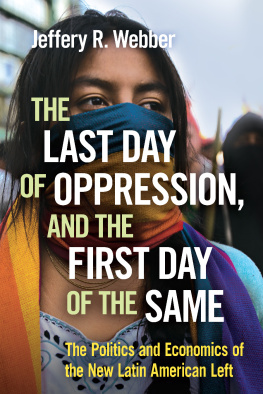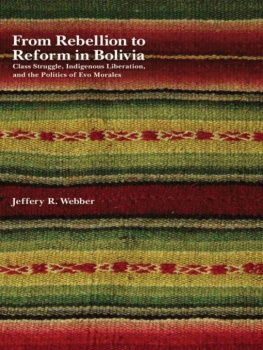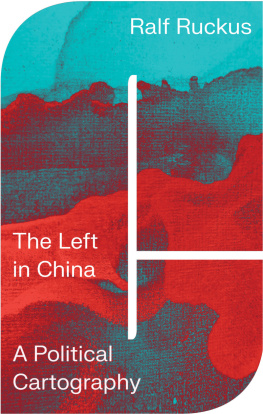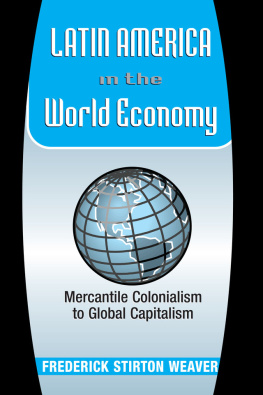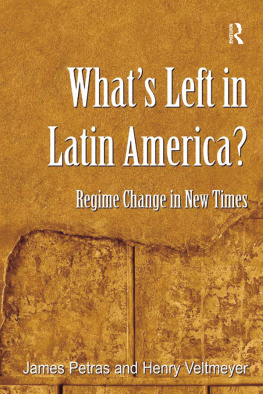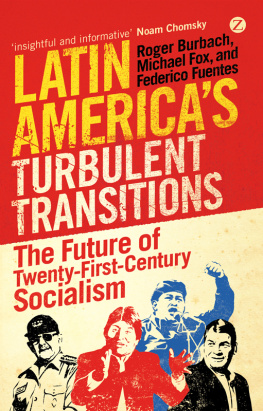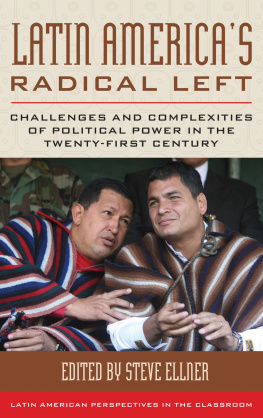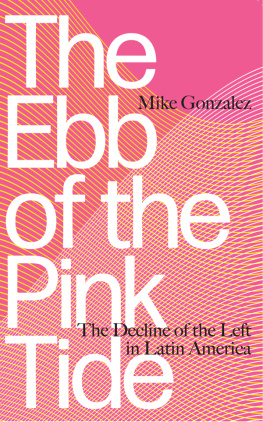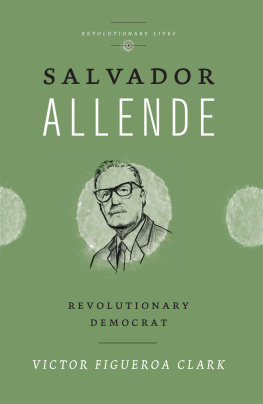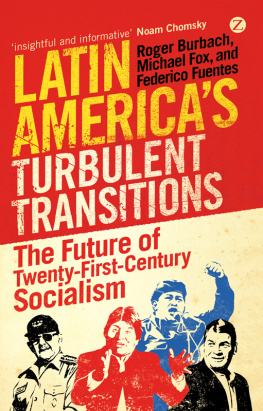Praise for The Last Day of Oppression, and the First Day of the Same
At a time when most scholars of contentious politics have abandoned political economy, Jeffery Webbers latest book is a breath of fresh air. He shows how the rise of the new Latin American left was linked to a regional crisis of neoliberal capitalism at the turn of the millennium. And he shows how the delayed effects of the global economic crisis of 20072008 pushed left and center-left governments to adopt a politics of austerity, creating new opportunities for the right. Webbers analysis is also sensitive to the class and other struggles within and between left parties and movements, struggles which shaped how these formations would react to changing material circumstances. In all, this is simply the best book we have on the rise and current crisis of the new Latin American left. Its also a model for how to analyze contentious politics.
Jeff Goodwin, New York University
If you have ever wondered what happened to the beacon of hope that was, until recently, Latin America, this is the book to turn to. With supreme grasp of the continents politics, Jeffrey R. Webber unpacks the contradictions of the left governments that once inspired dreams of a twenty-first-century socialism. Most importantly, he shows how they banked on extracting natural resources for the global market and then distributing the crumbs to the massesand how dismally that strategy failed. Weaving together GDP data and traditions of anticolonial resistance, individual biographies, and debates in Marxist theory, always with a pulse of street movements running through the text, this is concrete analysis of the conjuncture as it should be done.
Andreas Malm, author of Fossil Capital: The Rise of Steam Power and the Roots of Global Warming
Combining Marxist and decolonial theoretical frameworks, Webber brings us much more than a study on economic policies: an insightful assessment of class struggles against the capitalist oligarchies and the market dictatorship in Latin America. In a brilliant discussion of Jos Carlos Maritegui, he brings to the fore the relevance, for the present popular, peasant, and indigenous rebellions, of a utopian-revolutionary dialectic between the precapitalist past and the socialist future.
Michael Lwy, author of Ecosocialism: A Radical Alternative to Capitalist Catastrophe
A lucid, incisive and indispensable contribution for understanding the rise and fall of left and center-left governments associated with Latin Americas pink tide. Webber validates the superiority of a critical Marxian and decolonial approach for slicing through the thick layers of the center-lefts self-serving rhetoric and for clearly identifying the tactical and strategic tasks popular movements have confronted in recent years. In the context of a fleeting commodities boom, the center-lefts embrace of extractivism and compensatory state politics, as well as its penchant for servicing the interests of domestic and foreign capital while demobilizing social movements, lie at the core of its ultimate defeat. His meticulously crafted analysis examines the ebb and flow of social movements in diverse Latin American countries and spans the critical years that opened up with Venezuelas 1989 Caracazo and are seemingly being brought to a close by right-wing resurgence, evidenced most clearly in the 2016 institutional coup against Brazils Dilma Rousseff. The end of the cycle of progressive governments poses new historical challenges. If they are to be successfully navigated, Latin American scholars (and societies) must overcome the stultifying effects of prevailing liberal conceptions about democracy, markets, capitalism, and the root causes of inequality; Jeffery Webbers book unflinchingly and brilliantly shows us why but also how to begin doing so.
Fernando Leiva, author of Latin American Neostructuralism: The Contradictions of Post-Neoliberal Development
One
Latin Americas Second Independence
Ecuadors independence from Spain in the early nineteenth century did not bring with it a social revolution. The racist and unequal pyramidal hierarchy of colonial society was not turned on its head. Instead, the elite descendants of Spanish conquistadores now ruled on their own behalf, rather than in the service of the Spanish crown. For those beneath them, much remained as it had been. Thus a popular slogan of the postindependence period emerged: the last day of oppression, and the first day of the same.
The expression, if in a novel form, captures something essential of the first decade and a half of twenty-first-century Latin American politics. The early 2000s saw a remarkable political and economic crisis of neoliberalism facilitate an explosive reawakening of extraparliamentary social movements throughout Latin America, but particularly in South Americastrikes, land occupations, unemployed workers roadblocks and factory takeovers, and indigenous uprisings. By the mid-2000s, this effervescence translated in a muted style into the parliamentary halls and presidential palaces of many South American countries as center-left and left parties were elected to office.
Parallel to these political dynamics, the economic crisis of neoliberalism in the region was eclipsed by the rising tide of a China-driven boom in international commodity prices. With minimal changes to the tax regimes and royalty rates on resource commoditiesmining minerals, natural gas and oil, and agro-industrial productsleft governments witnessed massive revenue increases in the state treasuries, even as multinational and domestic capitalists enjoyed soaring net profits. Targeted distribution through cash-transfer programs and other social welfare initiatives, along with higher employment rates, led to falling poverty rates, and even some falls in income inequality in parts of Latin America ruled by the various shades of the left.
Still, even taking into account variability across cases, the new Latin American left did not challenge the underlying class structures of its societies or the systems of capitalist accumulation that fundamentally reproduce the basic patterns of simultaneous wealth and poverty, of luxury alongside misery. The facility with which center-left and left governments were able to skim a portion of the rent generated by the commodities boom and redirect it to the popular classes helped for a time to conceal underlying structures of continuity. Politically, social movements were channeled into the labyrinth of state apparatuses and significantly disarmed in the process.
Then global capitalism entered its latest severe crisis in 20072008. The impact on Latin America was not immediate. Indeed, after a dip in growth in 2009, the next two years seemed to suggest the region had somehow escaped world dynamics. By 2012, however, China had dramatically slowed down, the Eurozone and the United States were sputtering, and the commodity prices that had done much to hold South America aloft started their swift descent. The politics of austerity already introduced with such rabidity in North America and Europe (especially southern Europe and particularly Greece) were now dictating the winds of Latin American political economies once again.
This time, however, it was center-left and left governments that began to make the class decisions of austerity politics. With declining state revenues, they beganagain with variation across casesto socialize the costs of declines in state treasuries onto the vast majority, rather than turning on the rich. They sided with the surplus appropriators rather than the direct producers of Latin American wealth. These class decisions often took the form of cuts to social programs that had been primed during the era of commodity booms. As opposed to radicalizing the left turn in the context of the emerging crisis, center-left and left governments increasingly adapted to the imperatives of capital. But while capital had flourished under many of these governments, the new left had never been the first choice of private investors. They have sensed blood, and are now going for the killnew right politics are on the ascent in extraparliamentary and parliamentary forms throughout the region.
Next page
